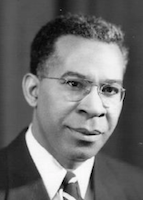Oliver Cox facts for kids
Quick facts for kids
Oliver Cox
|
|
|---|---|
 |
|
| Born | August 24, 1901 Trinidad and Tobago
|
| Died | September 4, 1974 |
Oliver Cromwell Cox (born August 24, 1901 – died September 4, 1974) was a sociologist from Trinidad and Tobago who later lived in America. He was known for his early ideas about how social classes work, especially when looking at fascism.
Cox grew up in a middle-class family in Port of Spain, Trinidad and Tobago. He moved to the United States in 1919. He was one of the first thinkers behind the "world-systems" idea, which looks at how the world is connected through trade and power. He also studied how racism is linked to the growth of global capitalism. In 1929, he got poliomyelitis (polio), which made both his legs unable to move well. This led him to change his plans from studying law to sociology. His parents were William Raphael Cox and Virginia Blake Cox.
Contents
Early Life and Schooling
Growing Up in Trinidad
Oliver Cox went to Saint Thomas Boys' School in Trinidad. There, he learned subjects like Math, English, and Languages.
High School and College in the US
After moving to the US, Cox attended YMCA High School in Chicago. He then went to Crane Junior College, also in Chicago.
University Studies
In 1927, he earned a Bachelor of Science degree from Northwestern University. He continued his studies at the University of Chicago, where he earned a master's degree in Economics in 1932. He then studied sociology at the same university, getting another master's degree in 1932 and his Ph.D. in 1938.
Family Connections
Oliver Cox's father, William Raphael Cox, worked as a captain on a boat that collected taxes. Later, he became a customs officer. His mother, Virginia Blake Cox, raised Oliver and his seven brothers and sisters. Oliver's uncle, Reginald Vidale, was a respected teacher at St. Thomas Boys’ School. He later became an Inspector of schools and even served as the mayor of Port of Spain.
Teaching Career
Cox started his teaching career at Wiley College in Marshall, Texas. In 1944, he also taught at Tuskegee Institute. Many people there believed he would bring fame to their school. Later, in 1949, he moved to Missouri. He taught at Lincoln University until 1970, when he decided to retire. After retiring, he accepted a job as a visiting professor at Wayne State University in Michigan.
Important Books and Ideas
Oliver Cox was a scholar who looked closely at capitalism and race. He wrote several books where he shared his ideas. His most famous and important book was Caste, Class and Race, published in 1948. In this book, he strongly disagreed with other scholars who thought race in the USA was like a "caste" system.
He also wrote:
- Foundations of Capitalism (1959)
- Capitalism and American Leadership (1962)
- Capitalism as a System (1964)
- Jewish Self-Interest and Black Pluralism (1974)
Cox believed that racial problems were deeply connected to the capitalist system. He argued that racial differences were used to divide workers and benefit those in power.
Awards and Recognition
Oliver Cox received several honors for his work. The American Sociological Association gives out two awards in his name every year:
- The Racial and Ethnic Minorities' Oliver Cromwell Cox Article Award (for anti-racist writing)
- The Section on Racial and Ethnic Minorities' Oliver Cromwell Cox Book Award (for anti-racist books)
Cox was also the very first person to receive the DuBois-Johnson-Frazier Award from the American Sociological Association.
Selected Works
Books by Oliver Cox
- Caste, Class, and Race: A Study in Social Dynamics, 1948
- Foundations of Capitalism, 1959
- Capitalism as a System, 1964
- Race Relations: Elements and Social Dynamics, 1976
Articles and Chapters
- "Marital Status and Employment of Women," Sociology and Social Research, 1940
- "Employment, Education, and Marriage of Young Negro Adults," Journal of Negro Education, 1941
- "Lynching and Status Quo," Journal of Negro Education, 1945
- "Jewish Self-Interest in 'Black Pluralism'", The Sociological Quarterly, 1974
See also
 In Spanish: Oliver Cox para niños
In Spanish: Oliver Cox para niños
 | Selma Burke |
 | Pauline Powell Burns |
 | Frederick J. Brown |
 | Robert Blackburn |

